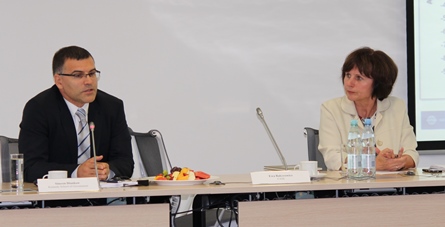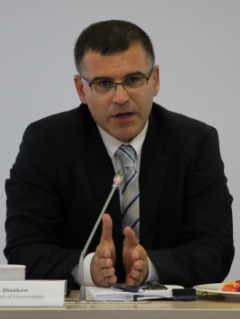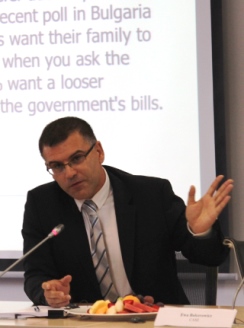127th BRE-CASE Seminar: Austerity Revisited
 The main problem in Europe is not austerity but the crisis. How can we solve it? What should we do to ensure Europe’s prosperous future without risking yet another crisis? Europe lacks a thorough debate – said Simeon Djankov – and austerity has become the basis for discussion about the real problem of Europe: its future.
The main problem in Europe is not austerity but the crisis. How can we solve it? What should we do to ensure Europe’s prosperous future without risking yet another crisis? Europe lacks a thorough debate – said Simeon Djankov – and austerity has become the basis for discussion about the real problem of Europe: its future.
Some questions remain: Do we need to take extra saving measures or keep our public expenditures at the level of public income? Should we adopt proper fiscal solutions or not, choosing instead to deal with the consequences in the future? While most of the Northern EU Member States, generally speaking, favor austerity, the Southern countries are against such solutions. The simple definition of austerity is to spend what is earned, which at the national level means nothing else than a balanced budgetary policy. However, according to the speaker, austerity is often unjustly associated with bad government policies and blamed for slowing down economic growth. For this reason, austerity measures are generally highly unpopular, thereby often hindering governments from introducing difficult yet indispensable structural reforms.
The simple definition of austerity is to spend what is earned, which at the national level means nothing else than a balanced budgetary policy. However, according to the speaker, austerity is often unjustly associated with bad government policies and blamed for slowing down economic growth. For this reason, austerity measures are generally highly unpopular, thereby often hindering governments from introducing difficult yet indispensable structural reforms.
Therefore, Djankov argued, we have to ask whether slow growth really is characteristic of fiscally responsible countries. According to Mario Draghi, the President of the European Central Bank, slow growth is not a characteristic of fiscally responsible countries, as it has been proven by evidence that the faster growing economies in Europe are not those implementing higher expenditure schemes.
In 2009, unlike Bulgaria, Romania and Greece did not introduce cuts in public spending, hoping for the crisis to be short lived. This, however, did not appear to be the case and led to the current financial difficulties of these countries. In contrast to this, Bulgaria decreased public deficit from 4.4% in 2009 to 0.5 % in 2012, placing it among the EU countries with the lowest public deficit, together with Sweden, Germany and Estonia. According to Djankow, painful reforms have to be introduced quickly in order to avoid the formation of public resistance to them, despite their likely effectiveness. In Bulgaria, for example, the most important changes took place within a month of Bojko Borysow’s election. Citizens perceive austerity differently in the case of their own household and their country as a whole. Only 25% of Spanish citizens declared the will to live off debts during the crisis, yet as much as 85% supports the looser budget at the national level.
Citizens perceive austerity differently in the case of their own household and their country as a whole. Only 25% of Spanish citizens declared the will to live off debts during the crisis, yet as much as 85% supports the looser budget at the national level.
Nevertheless, Djankov pointed out that healthy public finances alone will not guarantee Europe’s exit from the crisis. There is an urgent need for the countries in crisis to be more competitive in production, especially in comparison with the economies of Germany or Northern European countries. Moreover, Southern Europe has to become more present both in the global economy and international trade. Measures to achieve this would include increasing productivity through better education or lower unit labor costs, which have been growing rapidly in the Southern Member States.
The discussion on austerity took place on June 13th, during the 127th BRE-CASE seminar.
The transmission is available at bankier.tv

